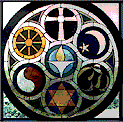About Unitarian-Universalism
1.We believe in the freedom of religious expression. All individuals should be encouraged to develop their own personal
theology, and to present openly their religious opinions without fear of censure or reprisal.
2.We believe in the toleration of religious ideas. All religions, in every age and culture, possess not only an intrinsic merit, but
also a potential value for those who have learned the art of listening.
3.We believe in the authority of reason and conscience. The ultimate arbiter in religion is not a church, or a document, or an
official, but the personal choice and decision of the individual.
4.We believe in the never-ending search for the Truth. If the mind and heart are truly free and open, the revelations which
appear to the human spirit are infinitely numerous, eternally fruitful, and wondrously exciting.
5.We believe in the unity of experience. There is no fundamental conflict between faith and knowledge, religion and the
world, the sacred and the secular, since they all have their source in the same reality.
6.We believe in the worth and dignity of each human being. All people on earth have an equal claim to life, liberty, and justice
-- and no idea, ideal, or philosophy is superior to a single human life.
7.We believe in the ethical application of religion. Good works are the natural product of a good faith, the evidence of an inner
grace that finds completion in social and community involvement.
8.We believe in the motive force of love. The governing principle in human relationships is the principle of love, which always
seeks the welfare of others and never seeks to hurt or destroy.
9.We believe in the necessity of the democratic process. Records are open to scrutiny, elections are open to members, and
ideas are open to criticism -- so that people might govern themselves.
10.We believe in the importance of religious community. The validation of experience requires the confirmation of peers, who
provide a critical platform along with a network of mutural support.
-- David O. Rankin
Unitarian Universalist Association
OUR COMMON QUESTEACH OF THE GREAT RELIGIONS HAS A DISTINCTIVE NOTE OF ITS OWN. THEY MAY BE LIKENED TO THE STRINGS OF A HARP.
In our never-ending search for the truth, we draw upon the lessons and inspiration of these great
religions that have served humankind around the world and through the ages:
CONFUCIANISM -- contributes the note of Order, bidding that people reproduce in all their relations
the beautiful, calm, unbroken order they see in the solar system.BUDDHISM -- intones of Renunciation, the stripping of oneself of earthly desire through ethical self-discipline.
SIKHISM -- sounds the call to Harmony, and the note of Equality, of all people under one God.
CHRISTIANITY -- The great and lofty note of Love," is heard in the doctrines of Christianity. The spiritual genius of Jesus
and the particular circumstances under which his teachings came into the world were such as to give the concept of love a
special emphasis and fresh interpretation.SHINTOISM -- is built around the note of Power.
TAOISM -- sends a note of Simplicity, to blend with the mysticism of China.
HINDUISM -- provides the note of the Spirit, repudiating the notion of "dead" or "inert" matter, on the ground that the
universe is thrilling, throbbing, pulsing with divine energy and meaning.ZOROASTRIANISM -- tells of spiritual warfare, culminating in the triumph of the Good Principle at war with the "evil
principle" in the universe, and calls for the cooperation of all human souls if world redemption is to be achieved.JUDAISM -- sounds the note of Righteousness. And how it resounds throughout the Old Testament, reaching its supreme
expression in the prophets.ISLAM -- the religion of the prophet Mohammed reveals the note of Submission, the supreme need of every human soul to
self-surrender to the "omnipotent and merciful Allah".JAINISM -- accents the note of Self-denial as the answer to victory of the spirit.
Mosaic plaques, symbolizing each of these great religious traditions, adorn the walls of our sanctuary. These mosaics keep us
mindful of the enduring values, the unique lessons, and the common ground that these age-old spiritualities share.In our Unitarian Universalist tradition we are free to delve into all faiths to uncover nuggets of truth that might help us to better
understand the deep mysteries of our Common Quest. We are free to celebrate and share the joy and wisdom of the festivals and
sacred holidays of all religions. Yet, importantly, we are also free to reject elements of religious dogma that fly in the face of fact
and reason, that demand we believe in notions that are contrary to our own experience and sense of morality, that threaten harsh
punishment for free-thinking and non-conformity, and that serve as divisive bones of contention within our one human family.If you are someone who dislikes being told what to believe, are honestly seeking your own personal theology, and wish to share
your insights and experiences within a religious community... you always have a home at a Unitarian Universalist church.Are You A Unitarian Universalist... And Didn't Know It?
